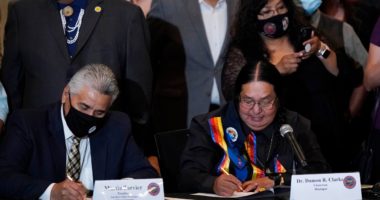
Although the legalization of sports betting in Arizona may be the primary cause for excitement, tribal casino operators perceive their businesses from a wider perspective. The expansion of tribal gaming in new agreements encompasses more than just sports wagering.
The new agreements will result in more casinos in Arizona, alongside an expansion of slots and table games at existing venues. Although the new compacts largely maintain the financial conditions of the previous contracts, they should ultimately lead to increased revenue for all parties involved.
Expansion details of tribal gaming in Arizona
Four new casinos will be the most conspicuous results of the recent agreements between the state and Indigenous peoples. Two of these casinos will be located in the larger Phoenix area, with the Gila River Indian Community planning to establish one just south of Phoenix.
The Tohono O’odham Nation is set to develop a property located at the southeast corner of Loop 303 and Northern Pkwy. The Navajo Nation may also introduce a new casino off Hwy 89 N in Flagstaff as part of their designs. Lastly, the Pascua Yaqui Tribe could potentially own the fourth property, which is likely to be situated east of I-10 in Tucson.
The new compacts technically allow for a larger number of tribal groups to establish new casinos throughout the state. There has been a significant increase in the statewide cap from 25 to 55. However, there are only existing plans for the previously mentioned four.
Another evident shift will be in the quantity of gaming spots at both existing and new casinos, beginning with slot machines. The cap on these machines has increased by approximately 6,300 across all gaming establishments in Arizona. Furthermore, every two years, this number can be boosted by an additional 550.
Furthermore, casinos will have the capability to begin providing a variety of live dealer table games, such as baccarat, craps, Pai Gao, roulette, and sic bo. It’s also worth noting that retail sports betting will be a new feature for 10 out of the 16 tribal casino operators.
Tribal gaming interests achieved a compromise with the state allowing non-tribal entities to offer gambling. The increased access to a wider range of games has left many hopeful about these compacts being mutually beneficial agreements.
Every participant receives a share.
A few smaller tribes in the state received a reprieve in their revenue-sharing agreements, reducing their rates from 1% of gross gaming revenue to merely 0.75%. However, for the majority, these rates remained unchanged. Generally, they fluctuate between a percent to 8%.
Even with the reductions for some compact-holders, the office of AZ Governor Doug Ducey remains hopeful that the overall outcome will benefit the state. Tribal leaders are also eager to provide the new forms of gambling at their establishments.
“Self-sufficiency and self-reliance is what it’s all about,” stated Jonathan Nez, the Navajo Nation President, during a ceremony that celebrated the new compacts.
The state holds the authority to revisit and modify the conditions of the compacts after another ten years. By that time, the supplementary income generated from the extra properties, slot machines, table games, and sports betting for the tribal casinos should have stabilized.
Sports betting may be the least profitable new gaming form for tribal casino operators. Due to federal laws, they are not allowed to offer online wagering on tribal lands. Non-tribal licensees, such as possibly DraftKings Sportsbook and TPC Scottsdale, are expected to drive mobile betting in AZ.
State regulators have not yet determined the tax rate that licensees will pay on their revenue. It’s feasible that the state’s percentage from this betting activity could exceed its portion from retail betting at tribal casinos, particularly if the tax rate exceeds 8%.
The new casinos and gaming positions are expected to expand the overall market, which should automatically increase everyone’s share. It’s certain that the gambling industry in AZ is on the verge of experiencing significant growth.







